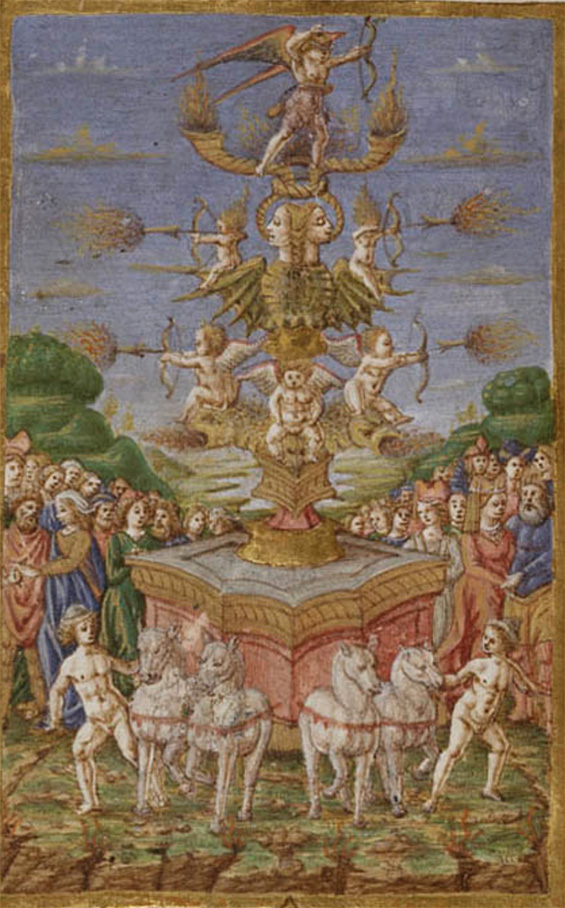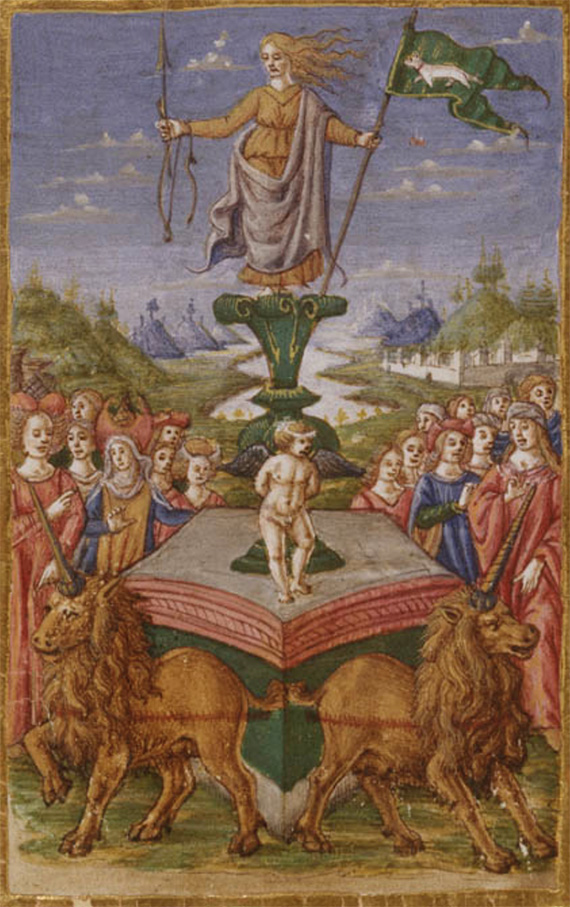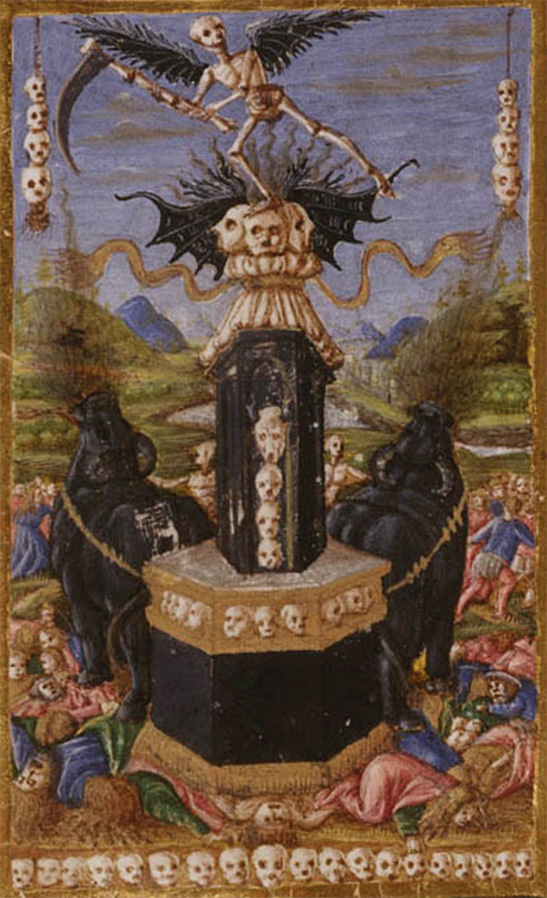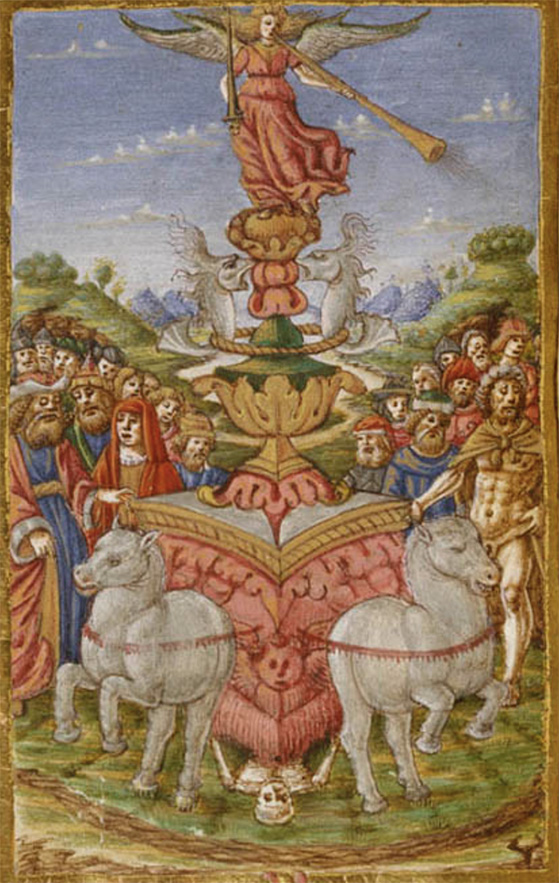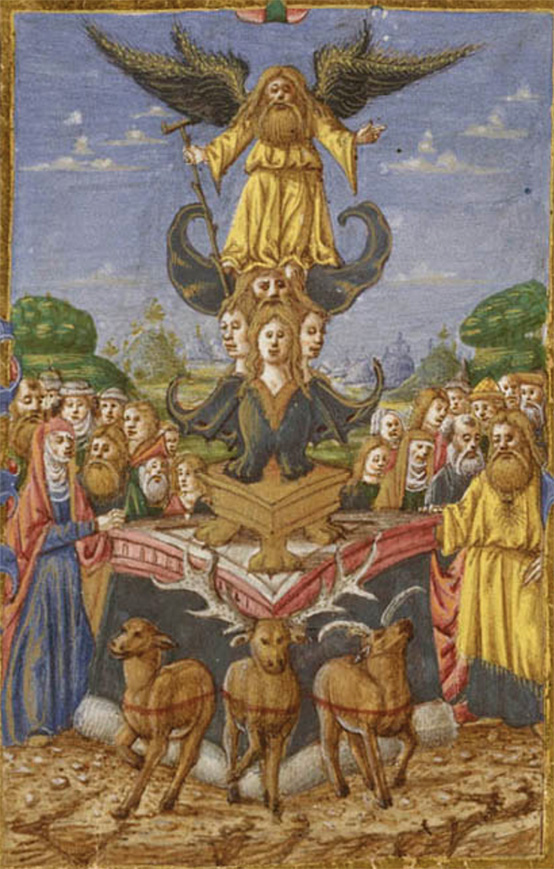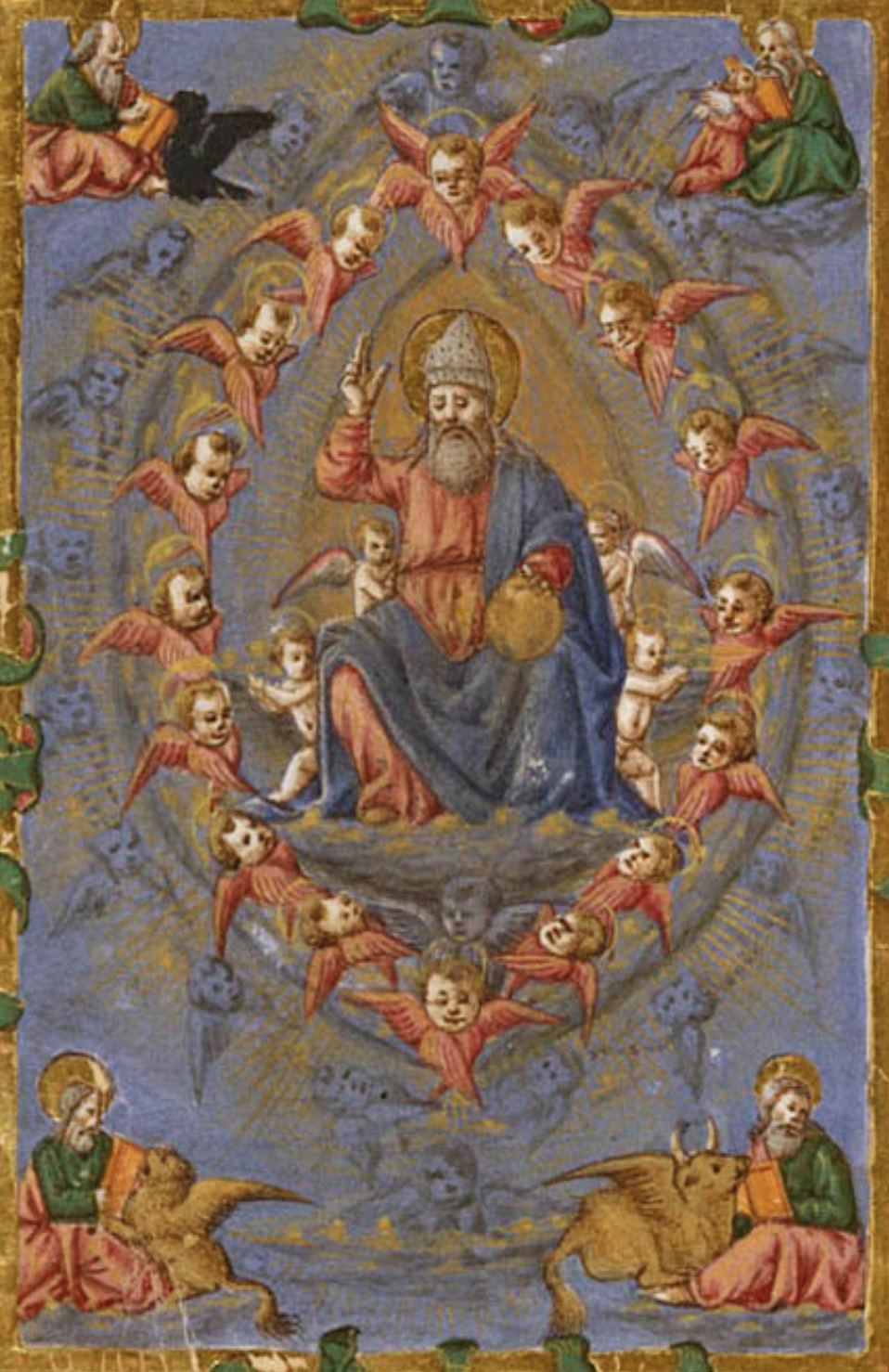Difference between revisions of "Trionfi"
Occultwiki (talk | contribs) |
Occultwiki (talk | contribs) |
||
| (One intermediate revision by the same user not shown) | |||
| Line 39: | Line 39: | ||
===Death=== | ===Death=== | ||
[[File:Reknown Triumph.jpg|300px|thumb|Triumph of Fame]] | [[File:Reknown Triumph.jpg|300px|thumb|Triumph of Fame]] | ||
Returning from the battle, the victorious host encounters a furious woman dressed in black, who reveals a countryside littered with the corpses of once proud people from all times and places, including emperors and popes. This personification of Death plucks a golden hair from Laura's head. Laura dies an idealised death, but returns from heaven to comfort the poet, who asks when they will be reunited in one of the most significant passages of the poem. She replies that he will survive her a long time. | Returning from the battle, the victorious host encounters a furious woman dressed in black, who reveals a countryside littered with the corpses of once proud people from all times and places, including emperors and popes. This personification of Death plucks a golden hair from Laura's head. Laura dies an idealised death, but returns from [[heaven]] to comfort the poet, who asks when they will be reunited in one of the most significant passages of the poem. She replies that he will survive her a long time. | ||
This later became [[Death]] card in the [[tarot]]. | This later became [[Death]] card in the [[tarot]]. | ||
===Fame=== | ===Fame=== | ||
Death departs and after Death comes Fame. Her appearance is compared to the dawn. She is attended by Scipio and Caesar, and many other figures from Rome's military history, as well as Hannibal, Alexander, Saladin, King Arthur, heroes from Homer's epics, and patriarchs from the [[Bible|Hebrew scriptures]]. Accompanying these soldiers and generals are the thinkers and orators of Classical Greece and Rome. It has been remarked that for | Death departs and after Death comes Fame. Her appearance is compared to the dawn. She is attended by Scipio and Caesar, and many other figures from Rome's military history, as well as Hannibal, Alexander, Saladin, King Arthur, heroes from Homer's epics, and patriarchs from the [[Bible|Hebrew scriptures]]. Accompanying these soldiers and generals are the thinkers and orators of Classical Greece and Rome. It has been remarked that for Petrarch, Plato is a greater philosopher than Aristotle, who was preferred by [[Dante Alighieri]]. | ||
This later became [[The Chariot]] card in the [[tarot]]. | This later became [[The Chariot]] card in the [[tarot]]. | ||
| Line 54: | Line 54: | ||
===Eternity=== | ===Eternity=== | ||
Petrarch finds consolation in the almighty [[Yahweh|God]] and the prospect of being reunited with Laura in heaven and timeless eternity. Eternity is not represented allegorically. | Petrarch finds consolation in the almighty [[Yahweh|God]] and the prospect of being reunited with Laura in [[heaven]] and timeless eternity. Eternity is not represented allegorically. | ||
This later became [[The World]] card in the [[tarot]]. | This later became [[The World]] card in the [[tarot]]. | ||
Latest revision as of 17:39, 19 November 2024
Trionfi are 15th-century Italian playing card trumps with allegorical content related to those used in tarot games. The general English expression "trump card" developed from the Italian "Trionfi." Most cards feature the personification of a place or abstraction.
Name
Trionfo is an Italian word meaning "triumph," also "triumphal procession", and a triumphal car or float in such a procession. The classical triumphal procession for victorious generals and Emperors known as the Roman Triumph was revived for "Entries" by rulers and similar occasions from the Early Renaissance in 14th and 15th-century Italy, and was a major type of festival, celebrated with great extravagance.
I Trionfi
Triumphs (Italian: I Trionfi) is a 14th-century Italian series of poems, written by Petrarch in the Tuscan language. The poem evokes the Roman ceremony of triumph, where victorious generals and their armies were led in procession by the captives and spoils they had taken in war. This was a popular and influential poem series when it was published.
Composition of the work started in 1351 and the final chapter was last edited on February 12, 1374, a few months before the author's death. The book was produced in many lavish illuminated manuscript versions.
Content
I Trionfi consists of twelve chapters (a total of 1,959 verses) ordered in six triumphs honoring allegorical figures:
The poem is structured in six allegorical triumphs. The triumphs are concatenated, so that the Triumph of Love (over Mankind and even gods) is itself triumphed over by another allegorical force, the Triumph of Chastity. In its turn, Chastity is triumphed over by Death; Death is overcome by Fame; Fame is conquered by Time; and even Time is ultimately overcome by Eternity, the triumph of God over all such worldly concerns.
Original triumphs
Love
One spring day in Valchiusa, the poet falls asleep and dreams that Love, personified as a naked and winged young man armed with a bow, passes by on a fiery triumphal chariot drawn by four white horses. Love is attended by a multitude of his conquests, including illustrious historical, literary, mythological, and biblical figures, as well as ancient and medieval poets and troubadours. Eventually the procession reaches Cyprus, the island where Venus was born.
Although only Love is described in the text as riding on a car or chariot, it became normal for illustrators to give them to all the main figures.
This later became The Lovers card in the tarot.
Chastity
Love is defeated by Laura and a host of personified virtues such as Honor, Prudence and Modesty, as well as chaste heroines including Lucretia, Penelope, and Dido. Love's captives are freed and Love is bound to a column and chastised. The triumphant celebration culminates in Rome, in the Temple of Patrician Chastity.
This later became The Hanged Man card in the tarot.
Death
Returning from the battle, the victorious host encounters a furious woman dressed in black, who reveals a countryside littered with the corpses of once proud people from all times and places, including emperors and popes. This personification of Death plucks a golden hair from Laura's head. Laura dies an idealised death, but returns from heaven to comfort the poet, who asks when they will be reunited in one of the most significant passages of the poem. She replies that he will survive her a long time.
This later became Death card in the tarot.
Fame
Death departs and after Death comes Fame. Her appearance is compared to the dawn. She is attended by Scipio and Caesar, and many other figures from Rome's military history, as well as Hannibal, Alexander, Saladin, King Arthur, heroes from Homer's epics, and patriarchs from the Hebrew scriptures. Accompanying these soldiers and generals are the thinkers and orators of Classical Greece and Rome. It has been remarked that for Petrarch, Plato is a greater philosopher than Aristotle, who was preferred by Dante Alighieri.
This later became The Chariot card in the tarot.
Time
Time is represented by the sun, chasing the dawn and racing across the sky, jealous and scornful of the fame of mortals. In an elegy on the fickleness of Fame the poet concludes that it will always eventually be followed by oblivion, the "second death."
This later became The Hermit card in the tarot.
Eternity
Petrarch finds consolation in the almighty God and the prospect of being reunited with Laura in heaven and timeless eternity. Eternity is not represented allegorically.
This later became The World card in the tarot.
Development of the card game
Many of the motifs found in trionfi were directly taken from the I Trionfi poem. The Palazzo Schifanoia in Ferrara, once owned by the ducal House of Este, contains many murals depicting these floats.
Earliest trifoni deck
The earliest known use of the name "Trionfi" in relation to cards can be dated to 16 September 1440 in the records of a Florentine notary, Giusto Giusti. He recorded a transaction where he transferred two expensive personalized decks to Sigismondo Pandolfo Malatesta.
In a letter from 11 November 1449, Antonio Jacopo Marcello used the expression triumphorum genus for a the earliest known deck that was produced sometime between 1418 and 1425.
The first Visconti-Sforza Tarot was commissioned by the duke of Milan, Filippo Maria Visconti, painted by Michelino da Besozzo and described in an accompanying text by Martiano da Tortona. The deck itself is lost, but Marcello provided a copy of da Tortona's description which offers details about the deck and a cursory explanation of how it is played.
It likely had a total of 60 cards (four kings, forty pip cards and sixteen trumps). The forty-four plain-suited cards used birds as suit signs and the trumps presented sixteen Roman or Greek gods:
- Jove
- Juno
- Pallas
- Venus
- Apollo
- Neptune
- Diana
- Bacchus
- Mercury
- Mars
- Vesta the Virgin
- Ceres
- Hercules
- Aeolus
- Daphne
- Cupid
In two suits, the pip cards are in reverse order as in many of the oldest card games. Each trump card is associated with a suit in alternating descending order of Eagle, Phoenix, Turtledove, Dove. For example, Jove, Apollo, Mercury, and Hercules are associated with the suit of Eagles.
Subsequent early decks
The first attestation of a deck with 78 cards was in a poem by Matteo Maria Boiardo of Ferrara written between 1461–1494. The deck was structured like modern tarots, but the motifs and suits signs of the Boiardo deck are totally different. He used classical figures for the face cards and trumps. Pier Antonio Viti of Urbino (c. 1470-1500), brother of Timoteo Viti, provided a commentary of Boiardo's poem as well as rules. He likely commissioned the production of these decks of which two incomplete packs have survived. Both the rules and the deck were likely conscious departures from common trionfi decks.
The order of the trumps varied by region, perhaps as early as the 1440s.
In Bologna and Florence, the highest trump is the Angel, followed by the World. This group spread mainly southward through the Papal States, the Kingdom of Naples, and finally down to the Kingdom of Sicily but was also known in the Savoyard states.
In Ferrara, the World was the highest, followed by Justice and the Angel. This group spread mainly to the northeast to Venice and Trento where it was only a passing fad. By the end of the 16th century, this order became extinct.
Shift to tarot
The earliest known appearance of the word "Tarocho" as the new name for the game is in the town of Brescia in northern Italy around 1502.
"Tarochi" was used in June 1505 in Ferrara. In December 1505, "Taraux" decks are mentioned as being produced in the papal enclave of Avignon in France. Around this time, the word "Trionfi" seems to modify its character in a playing card context; it appears as a game of its own and seems no longer connected to the specific allegorical cards. This is most likely due to the popularity of Trionfa which usurped the old name. The word taroch was used as a synonym for foolishness in the same period.
| Tarot Topics | ||
|---|---|---|
| Major Arcana | The Fool • The Magician • The High Priestess • The Empress • The Emperor • The Hierophant • The Lovers • The Chariot • Strength • The Hermit • Wheel of Fortune • Justice • The Hanged Man • Death • Temperance • The Devil • The Tower • The Star • The Moon • The Sun • Judgement • The World | |
| Minor Arcana | Pentacles | Ace • Two • Three • Four • Five • Six • Seven • Eight • Nine • Ten • Page • Knight • Queen • King |
| Wands | Ace • Two • Three • Four • Five • Six • Seven • Eight • Nine • Ten • Page • Knight • Queen • King | |
| Cups | Ace • Two • Three • Four • Five • Six • Seven • Eight • Nine • Ten • Page • Knight • Queen • King | |
| Swords | Ace • Two • Three • Four • Five • Six • Seven • Eight • Nine • Ten • Page • Knight • Queen • King | |
| Decks | Visconti-Sforza Tarot • Tarot of Marseilles • Rider-Waite Tarot • Thoth Tarot • Occult Tarot • Angel Tarot • Vlad Dracula Tarot • Hieronymus Bosch Tarot | |
